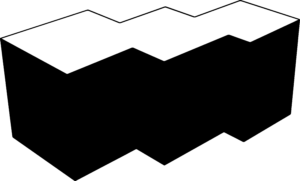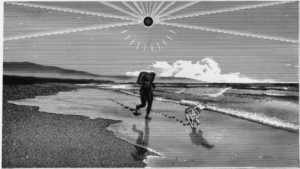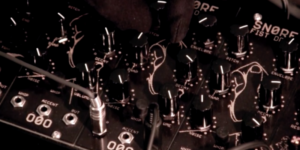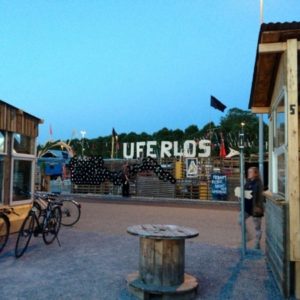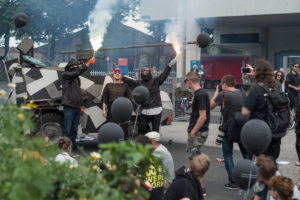This year we took our Digital Media students from Coventry University to an exchange with Digital Media students from Leuphana Unviersity to Berlin, during the Transmediale Festival. A student excursion as a collaboration between Leuphana University, Coventry University and transmediale whereby students from the digital media bachelor programs of both schools can engage with the content of the festival while also having space and time for guided reflection, led by the organising faculty and invited guests, in the period of February 2nd through February 5th, mixing groups of digital media bachelors students from
Leuphana University and Coventry University. The aim will be for students to engage with the festival activities while having moments to reflect theoretically, artistically and technically with the material at hand.
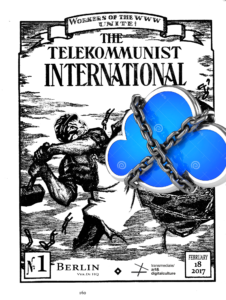
I made a note of the following sessions at Transmediale:
Material Flows: Rafts and Bodies at Sea
Starting from the project Plastic Raft of Lampedusa (by YoHa, 2016–17), featured in the exhibition “alien matter,” this session discusses moments where technical objects such as watercraft and human life becomes inseparable. By dismantling the type of rubber boat used by refugees for crossing the Mediterranean, the project addresses an underexplored space where technical objects and human bodies historically and contemporaneously conjoin and merge into new entities. Placelessness is contrasted with the forms of governance, materials, and technical standards that have the power to hold a body afloat or allow it to drown. It is an extreme metaphor for our relationship to digital technologies, where bodies emerge that are in transversal collaboration with technical objects and the administrative machinery of advanced capitalism. This is not a project that is concerned with the morals of the European migrant crisis, nor is it an attempt to re-invoke the sublime of European aesthetics. This project is about a plastic boat whose journey takes place in the sea’s lack of fixity, the space between different state actors and scales of administrative discipline.
YOHA–PLASTIC RAFT OF LAMPEDUSA
As part of the special exhibition “alien matter” at Haus der Kulturen der Welt, The DAZ (Deutsches Architektur Zentrum) hosts the disassembled rubber raft of _Plastic Raft of Lampedusa_ by artist duo YoHa. In their work, the artists explore the circulation of economic, material, and human flows that have a mutual influence on one another. 2–8 FEBRUARY 2017, DAILY 15:00–20:00 Deutsches Architektur Zentrum DAZ Köpenicker Straße 48/49, 2. courtyard, 10179 Berlin
www.daz.de
TRACING INFORMATION SOCIETY–A TIMELINE
In collaboration with the Technopolitics working group, transmediale presents the exhibition “Tracing Information Society–a Timeline” at neue Gesellschaft für bildende Kunst (nGbK). Technopolitics turns the
exhibition venue into a curated space for knowledge. A twelve-meter-long timeline depicts the development of the Information Society from 1900 until today.
Elemental Machines
The concept of machines generally describes an assemblage of parts assigned to an overall function, designed by a human. Yet, the entwined histories of science, technology, and art are filled with ideas about nature functioning like machines, and of visions where machines become “natural” and organic. These two paths seem to merge as machines increasingly communicate autonomously and operate in fields beyond human perception and influence. Can we devise new perspectives for understanding the elemental machines that now seem to operate contingently within hybrid techno-ecologies like the forces of nature? What are the new aesthetic and political affordances or subjectivities involved in the process of technology becoming environmental?
Becoming Infrastructural – Becoming Environmental
What does the infrastructural and environmental becoming of technology really mean? Which economic, cultural, and geopolitical factors become apparent when we overcome the purposeful dematerialization of media? How can new infrastructural imaginaries, escaping anthropocentrism, embrace a different understanding of the role and impact of technology today? To address these questions, different emerging ecologies and multiple paradigms become the starting point for a keynote conversation. Lisa Parks examines entanglements of the natural with the technological, and presents the unknown use, adoption, and interruption of infrastructural sites by nonhuman species, pointing towards new conceptualizations for their uses beyond the human. Erich Hörl approaches “environmentality” as a new contemporary condition, discussing how within this new “General Ecology,” we must take into account the environmental becoming, not only of technology, but also of power, thinking, and the world itself. The keynote conversation explores the challenges and limitations of this new infrastructural and environmental condition.
Excursion: Ecologies
The event features new artistic research into messy, disperse ecologies, which characterize planetary life, as it is re-constructed in flows of data, capital, and natural resources. In order to make the underlying planetary systems more tangible, the micro- and macro-political will be connected and the problematics of scale are brought to the foreground through the projects Mycelium Network Society and Shift Register.
Mycelium Network Society, a brand new network initiative situated in a post-internet mudland, diverts the pursuit of magic mushroom, from a state of hyper-hallucination to collective fungal consciousness, and investigates the fungi culture, its network capacity to communicate and process information.
Shift Register is a research project investigating how human media, technological and infrastructural activities have marked the earth. It investigates and renders legible the material evidence of human activities on earth, registering these not as indicators of human achievement, but as ambiguous negotiations and signposts of planetary exhaustion.
Friendly Fire: What Is It to Re-think Radical Politics, Today?
In light of recent political events like Brexit and the Trump victory, the Left must re-think its approaches. The rise of Right-wing populism is transforming the arena of conflict, struggle, and antagonism, marking it with increasingly xenophobic and nationalistic politics. How can the Left question and understand this arena anew? Is there an emergent politics, which can design effective forms of organization and confrontational strategies, and extend the logics of political communication? How should the Left reconsider radical agendas and strategies? And how can it effectively adjust trajectory and mobilize forces to confront the increasingly hostile, cynical, and polarized social, economic, and political terrain? Central to this new terrain is a rapid re-articulation of relationships between the masses, communities, movements, infrastructures, and media, both old and new. This panel reflects on the role of digital media in the political field, the data infrastructure of the public sphere, and a politics of re-collectivity that reexamines conflict and struggle as progressive forces in democracy.
This panel is a cooperation between Berliner Gazette and transmediale and launch for the Berliner Gazette annual project FRIENDLY FIRE
Hegemonic Media and Their Opponents
Persistent inequalities continue to prevail on the dark side of today’s powerful media platforms. Companies like Facebook and Google possess the power to shape ideologies, beliefs, and desires by offering a range of services from providing Internet access to supplying infrastructures for the accumulation and organization of information. The panel will discuss emerging forms of digital colonialism while looking into various examples of opposition and resistance. Can we confront the subtle and hidden forms of this new cultural hegemony? Who are (or aren’t) the new digital subalterns? Focal points of discussion include the defeat of Facebook’s Free Basics service in India, the politics of the Google Cultural Institute, and new transcultural forms of resistance.
Immediate & Habitual: The Elusiveness of Mediation
With the increased networking of our digital world, media technologies—once stable apparatuses of communication—have dissolved into new ecologies. Being composed of and affected by human and nonhuman actors, users and machines, fleshy bodies and digital objects, such media ecologies overcome previously conceived separations and dichotomies between culture and technology. How does this ongoing yet unnoticeable shift transform our everyday life? And what renders the processes behind media technology today so elusive? During this keynote conversation, two prominent Media Studies scholars shed light on these questions from different angles. Richard Grusin emphasizes the role of a new immediate, radical, and ubiquitous form of mediation that transcends communication, affecting future-oriented events. Wendy Chun stresses the importance of the habitual character of media technologies today, through which media becomes part of our lives, and in reverse our lives become part of a new technological culture.
Middle Session: The Elemental Middle
As media steadily melt into the environment, they become both more naturalized and estranged in the sense that we understand the way they work less and less. The “Elemental” Middle Session highlights the unnoticeable media we live and work among, focusing equally on their material (technical) properties and their cultural meanings. Rather than relying on the worn-out critical mechanisms of “revealing what lies beneath” or “exposing hidden truths,” the discussion focuses on de-naturalization and re-familiarization. Speakers discuss areas of infrastructural intersection and entanglement, identifying ways in which structures of power reinforce each other through ubiquitous media. What are the “elemental” substrates of contemporary media? Is it helpful or possible to try and reduce a complex ecosystem of human and nonhuman actors to its elementary particles?
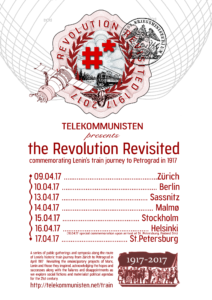
Prove You Are Nonhuman
From the time of the famed Turing test until today, humans have engaged with different forms of artificial intelligence, drawing comparison to possibilities of the human brain. The role of the human, capable of complex processes that machines cannot perform, has often been to intervene and secure proper functioning of machine learning systems. In today’s entangled condition, with examples of bots tweeting as humans, filtering and moderating news content, or as high frequency traders defining financial flows, it is increasingly difficult to tell who or what is acting. Is it possible to locate and comprehend the role and function of nonhuman actors? Which old and new approaches are might be of use? What would it take and what would it mean to stop anthropomorphizing computers and obtain a machinic point of view?
Singularities
A singularity is a point in space-time of such unfathomable density that the very nature of reality is brought into question. Associated with elusive black holes and the alien particles that bubble up from quantum foam at their event horizon, the term ‘singularity’ has also been co-opted by cultural theorists and techno-utopianists to describe moments of profound social, ontological, or material transformation—the coming-into-being of new worlds that redefine their own origins. Panelists contend with the idea of singularities and ruptures, tackling transformative promises of populist narratives, and ideological discrepancies that are deeply embedded in art and design practices. By reflecting on Afrofuturism and digital colonialism, they will also question narcissistic singularities of ‘I,’ ‘here,’ and ‘now’, counter the rhetoric of technological utopias, and confound principles of human universality.
Strange Ecologies: From Necropolitics to Reproductive Revolutions
In this keynote conversation Steve Kurtz and Johannes Paul Raether explore the less visible or even unacknowledged territories associated with the politics of death and reproduction in the Capitalocene. The impact of excessive human influence on life and our planet’s environments frame most progressive discussions about ecology today, simultaneously making the world both naturalized and denaturalized. Humans are typically treated as a dangerous alien force upsetting the balance of nature, and a force of reduction in terms of diversity and complexity in nature. At the same time, humans have long known that life and the environment are not balanced, nor do they have any necessary direction or purpose. Situated in the middle of strange ecologies, the challenge is to confront the full spectrum of power mechanisms and politics behind our environmental and evolutionary thinking. Through two talks and a conversation, Steve Kurtz and Johannes Paul Raether address the environment, death, and the practices, ethics, and politics of reproduction, questioning their contradictions and paradoxes.
Thanks to C-Base we had the perfect location for this series of student workshops during the Transmediale Festival. The Program was as follows:
THURSDAY, FEB 3
Presentations by Future Design City Feb 2, 15:00 – 16:00 @ C-Base Towards Urban Interactions The rise of computation embedded into objects, walls, and buildings introduces a new paradigm for the way humans interact with their environments. How will we design the relationship between people and such connected spaces? How might interactive systems scale across everyday human experience? And which new opportunities and challenges could appear, when we imagine future cities as networks of overlapping, dynamic data points?
Bio Andreas Rau
Andreas Rau is an interaction designer, creative coder and jazz pianist based in Berlin. As co-founder of the Institute for Urban Interactions, he researches the interplay of people and their environments in emerging interactive spaces. His concepts and prototypes aim to create meaningful experiences across the physical and digital worlds, always questioning the relationship between the two.
www.andreasrau.eu
www.urbaninteractions.org
Live Code and Live Algorithms – Feb 2, 16:00-18:00 @ C-Base
A showcase of work by students of the course on Live Coding and Live Algorithms given at Leuphana University this past semester. Thirteen students will perform short live or algorithmic music sets they have been creating over the past weeks. Performances by (in no particular order): Kai Man Wong | Sebastian Ganschow | Lucas Wolf | Nico Hampl | Jan Brinkmann | Franziska Henne | Henri Nehlsen | Santi Colombatto | Hannah Keymling | Anna-Maria Dickmann | Kajetan von Hollen | Kersten Benecke | Daeun Jeon
CTM 2017 – Fear Anger Love Feb 2, 22:00 – 05:00 Berghain/Panoramabar
Berghain | Disturbance: Actress | DJ Stingray | Moor Mother | SKY H1 | Yally [Raime] Panorama Bar | Heat: ENDGAME | Mechatok | mobilegirl | Virgil Abloh 02. Februar 2017 | Doors: 21 Uhr / 9 pm | Start: 10:00 pm | Eintritt ab 18 Jahre! / x-rated Please respect our no-photos policy
FRIDAY, FEB 3
ACTIVITIY STREAM A:
TidalCycles Workshop – Feb 3, 12:00-17:00 @ C-Base led by Alex McLean & Alexandra Cardenas
TidalCycles (or Tidal for short) is a language for live coding patterns of events in time. It allows you to make musical patterns with text, describing sequences and ways of transforming and combining them, exploring complex interactions between simple parts. Tidal does not make sound itself, but is designed for use with the SuperDirt synth, and can control other synths over Open Sound Control or MIDI. This workshop will explore the expressive power of the Tidal language as a way of generating and performing musical sequences. Tidal is a very intuitive language, and thus should be accessible to total beginners using the built-in sound material Tidal provides. For those with experience in SuperCollider, you’ll be happy to know that Tidal can be used as a sequencing language for all the sophisticated synths and sample playback mechanisms you’ve created in SuperCollider. https://tidalcycles.org/
PREPARATIONS FOR THE WORKSHOP
It is important that all students attending this workshop bring a laptop and install all the pre-requisite software in advance. This means you need to install Haskell, Atom, SuperCollider (3.7 or later) and
Git.
For installation instructions use the following links:
Installation instructions for Mac Users https://www.youtube.com/watch?v=dJTfGv2sT-w
Installation instructions for all platforms https://tidalcycles.org/getting_started.html
ABOUT THE WORKSHOP LEADERS
Alex McLean (UK) has been active across the digital arts since the year 2000, including live coding music, and software art for which he won the Transmediale award in 2002. Alex co- founded the TOPLAP and Algorave movements, and has collaborated widely including as part of Slub, Canute, aalleexx, and xynaaxmue. He completed his PhD thesis on Programming Languages for the Arts at Goldsmiths London, during which time he initiated the free/open source live coding environment TidalCycles, connecting code and music to create a rich approach to pattern making. Alex is based between Sheffield UK, and the research institute in the Deutsches Museum in Munich, where he uses live coding techniques to explore the ancient thought processes of textile weavers, for the European project PENELOPE lead by Ellen Harlizius-Klück. He releases his solo music as Yaxu on the Computer Club label, including the EP Peak Cut and forthcoming album Spicule. He curates the Festival of Algorithmic and Mechanical Movement, and is co-editing the Oxford Handbook on Algorithmic Music with Roger Dean, due out during 2017. yaxu.org
Alexandra Cardenas (CO) is a composer, programmer, and improviser of music born in Bogotá, Colombia in 1976. She studied composition at the Universidad de Los Andes where she also carried studies in mathematics and classical guitar. Using open source software like SuperCollider and TidalCycles, her work is focused on the exploration of the musicality of code and the algorithmic behavior of music. Alexandra is among the pioneers of live coding in electroacoustic music and part of the forefront of the Algorave scene. Currently, she lives in Berlin, Germany, and is doing her masters in Sound Studies at the Berlin University of the Arts. cargocollective.com/tiemposdelruido
ACTIVITIY STREAM B:
Exhibition Tour – Feb 3, 12:30-17:30
To facilitate reflection, we ask the organisers of transmediale for a spacewhere the students can convene at specific times on a daily basis with the faculty from Coventry and Leuphana, as well as guests invited from the festival roster. For this we would only need a room to convene in at a specific time each day.
The students at Leuphana will have had a course on live coding performance and be able to contextualize and deeply appreciate the artists who perform during the Algorave events put forth in the second proposal of this package.
While the younger group of students from Coventry will be able to experience this event as an expose of what is artistically possible with code. The more advanced students from the Leuphana group will have the option to perform their work during the early slot of the proposed Algorave night.
1 – Critical Constellations of the Audio-Machine in Mexico
Kunstraum, Mariannenplatz 2 12:30
This year’s exhibition takes as its focus the history and current state of electronic music and sound art in Mexico, guiding visitors through the various different musical styles and sound experiments that have emerged in the country since the beginning of the 20th century. Curated by sound researcher Carlos Prieto Acevedo, the exhibition features work by a number of active members of the Mexican sound art community, including Ariel Guzik, Angélica Castelló, Guillermo Galindo, Roberto Morales Manzaneres, Verónica Gerber, Mario de Vega and Carlos Sandoval. Talks and performances featuring Mexican music from the last 20 years as well as reworks and reconstructions of pieces from the beginnings of experimental music in Mexico link the exhibition to a larger international context
2 – Primitives
HAU2, Hallisches Ufer 32 15:00
Alan Warburton’s “Primitives” installation will be on display during the festival week, free of charge, exploring the intersection of entertainment and science using cutting-edge CGI “crowd simulation” software. This technology is normally used in Hollywood blockbuster films to fill out cities, stadiums and battlefields and also by researchers and engineers working in crisis mapping, city planning and events management. Warburton’s AV project explores this simulation software to “liberate the digital crowd” and allow it to live and explore more experimental parameters.
3 – On the Far Side of the Marchlands
Schering Stiftung, Unter den Linden 32-34 16:30
The exhibition “On the Far Side of the Marchlands” at Schering Stiftung explores the potential of radically new topographies through border regions (marchlands) created by the artists, composed from inextricably linked realms of experience, culture, and materiality. The 3D Additivist Cookbook, conceived and edited by Morehshin Allahyari and Daniel Rourke, is the point of departure for the exhibition, bringing together radical projects by over one hundred artists, activists, and theorists.
Algorave – Feb 3, 20:00 - 00:00 @ HKW
Algorave embraces the alien sounds of raves from the past, and introduce alien, futuristic rhythms and beats made through strange, algorithm-aided processes. It’s up to the good people on the dance floor to help the musicians make sense of this unstable situation and do the real creative work in making a great party. These days just about all electronic music is made using software, but with artificial barriers between the people creating the software algorithms and the people making the music. Using systems built for creating algorithmic music and visuals, these barriers are broken down, and musicians are able to compose and work live with their music as intricate processes. Algorithmic music is no new idea, but Algorave focuses on humans making and dancing to music. Algorave musicians don’t pretend their software is being creative, they take responsibility for the music they make, shaping it using whatever means they have. More importantly the focus is not on what the musician is doing, but on the music, and people dancing to it. Organized in collaboration between transmediale, Alex McLean, Alexandra Cardenas and Jonathan Reus, the Algorave at this year’s transmediale is the first event of its kind in Berlin. It is a kind of “coming home”, a celebration of transmediale’s history of supporting the early development of live coding since the early 2000’s, as well as celebrating how far live coding has come as a practice since then. With sets by: Alexandra Cardenas & Camilla Vatne Barratt-Due (CO/NO) | Alex McLean (UK) | coï¿¥ï3⁄∕4¡pt (UK) | La verbena electronica (ES) | Belisha Beacon (BE) | Fredrik Olofsson (DE) (visuals) | Miri Kat (UK) (visuals)
ORGANISERS
Jonathan Reus-Brodsky (Leuphana University, DE)
Jonathan Reus-Brodsky is an American composer-performer whose musical work blends machine aesthetics with free improvisation. In 2009 Jonathan received a Fulbright Fellowship to conduct research into computationally-mediated music systems at the Studio for Electro-Instrumental Music (STEIM) in Amsterdam. Afterwards he worked at STEIM as a curator, research coordinator and educator. He is a founding member of the Instrument Inventors Initiative performative media collective based in The Hague. He is lecturer for Computational and Coded Cultures at Leuphana University, Lüneburg.
Adnan Hadzi (Coventry University, UK)
Adnan Hadzi undertook his practice-based PhD onFLOSSTV – Free, Libre, Open Source Software (FLOSS) within participatory TV hacking Media and Arts Practices’ at Goldsmiths, University of London. Adnan’s research focuses on the influence of digitalization and the new forms of (documentary-) film production, as well as the author’s rights in relation to collective authorship.
Rob Canning (Coventry University, UK)
Rob Canning is a composer and performer with a research focus centred around networked creativity and open working methodologies. His recent work explores possible interplays between performers and network delivered instruction sets; these range from traditional ensemble pieces which utilise browser based net-scores to simultaneous network streamed sonic drifts as in his Streamscape project.
PROFILE OF STUDENT GROUPS
The organizing faculty from Leuphana and Coventry will each bring a group of approximately 25 students to participate in the excursion. Leuphana University, Bachelors Major of Digital Media
The Major of Digital Media bachelors at Leuphana University aims to educate students to have a wholistic view of the digital as it exists in its myriad formations in science, culture and aesthetics. The program originates out of a joint cooperation between the Digital Cultures Research Lab and Institute for Culture and Aesthetics of Digital Media. Students receive a mixed course load from diverse teachers in computer science, history and epistemology of computing, software studies, creative coding, digital art, electronic music, net critique and similar topics. The group attending the excursion will be in their 3 rd year of study in the new digital media major, and have already completed much of the above coursework. The excursion will serve as the culmination of a hands-on seminar on livecoding and computer music.
Coventry University, Digital Media Bachelors
The group of Digital Media students from Coventry will be in their first year of study, and therefore be extremely new to digital cultures and creative use of digital media. We see the pairing of these students with the more advanced group from Leuphana as an ideal informal mentorship situation.
REFLECTION SPACE
In order to facilitate daily theoretical discussions around the experiences of the festival, we ask that transmediale provide a meeting space once per day for the organising faculty and the student groups to convene. The space should provide adequate seating for up to 50 students, a video projector and stereo sound.
ALGORAVE SHOWCASE
SYNOPSIS
We propose an Algorave showcase night as part of transmediale’s activities for 2017 – organized in collaboration between transmediale, Jonathan Reus-Brodsky, Alex McLean and Alexandra Cardenas, artists from the live coding scene who are eager to realize Berlin’s first Algorave as a celebration of transmediale’s history of supporting the early development of live coding since the early 2000’s. Next to the main Algorave club night we also propose a possible mini-symposium and public live coding workshops.
PROPOSAL
We propose an Algorave club night as part of Transmediale’s activities for 2017. The Algorave will be the first event of its kind in Berlin, and will be organized in collaboration between transmediale, live coding pioneer Alex McLean, Mexican live coder/composer Alexandra Cardenas and American live coder/instrumentalist Jonathan Reus-Brodsky. The Algorave showcase at transmediale’s historic 30 year anniversary comes out of a desire to celebrate transmediale’s history of supporting the early
development of live coding since the early 2000’s. In this way, the Algorave at transmediale is a kind of coming home, a celebration of how far live coding has come as a practice and a focal point for thinking where it may go. Along with the club night, we propose a mini-symposium and public workshops around the Genesis and Cultures of live coding.
The students from Leuphana University described in the student excursion proposal of this package will have just had a course on live coding performance and be able to contextualize and deeply appreciate the artists who perform during this event, and hopefully participate as part of an early slot during the club night.
ORGANISERS
Jonathan Reus-Brodsky (Leuphana University, DE)
Jonathan Reus-Brodsky is an American composer-performer whose musical work blends machine aesthetics with free improvisation. In 2009 Jonathan received a Fulbright Fellowship to conduct research into computationally-mediated music systems at the Studio for Electro-Instrumental Music (STEIM) in
Amsterdam. Afterwards he worked at STEIM as a curator, research coordinator and educator. He is a founding member of the Instrument Inventors Initiative performative media collective based in
The Hague, and teaches as lecturer for Computational and Coded Culture at Leuphana University, Lüneburg.
Alexandra Cardenas (MEX/DE)
Alexandra Cardenas is a Colombian composer and improviser based in Berlin, who has followed a path from Western classical composition to improvisation and live electronics. Her recent work has included live coding performance, including performances at the forefront of the Algorave scene.
Alex McLean (UK)
Alex McLean is a software artist, live coding musician and researcher based in Sheffield UK. He is active in the live coding community, including creating the live-coding environment TidalCycles, an co-founding the TOPLAP and Algorave movements. He has performed widely since the year 2000 in several collaborations including Slub with Dave Griffiths and Adrian Ward, Canute with Yeeking (Rephlex), and aalleexx with Alexandra Cardenas. Alex performs solo as Yaxu, releasing music on the Computer Club label, including Peak Cut EP which Bleep.com described as a “.. polyrhythmic and hyperreal strand of techno .. showcased on cuts like Public Life and Cyclic showing that he is not just testing the confines of how music can be consumed but also how genres can sound.” He won the Transmediale Software Art award in 2001, the British Science Association Daphne Oram Award Lecture in 2015, and is sound artist in residence at the Open Data Institute during 2016. He is currently
co-editing the Oxford Handbook on Algorithmic Music with Roger Dean.
ALGORAVE CLUB NIGHT
We propose a club night featuring a showcase of some of the top artists from the Algorave scene, presenting a whole night of live coded electronic dance music and presented in collaboration with
Alexandra Cardenas and Alex McLean . The club night ideally begins early (7pm), with an early slot
for the more advanced students of Leuphana University’s digital media program to perform with
their work from the previous semester’s seminar on live coding. After the early slot we transition
into a full club evening with the featured artists, going late into the night. Leuphana University is
able to contribute towards the fees of the artists, as they will also participate in more intimate
encounters with the students.
VENUE & TECHNICAL REQUIREMENTS
• A medium-sized dance venue with loud stereo sound system
• Multiple projectors & projection screens for visualists and projection of code.
• A long standing-height table where multiple artists can set up simultaneously.
• It will be necessary to have a sound technician for the evening.
ARTIST TRAVEL & FEES
• Leuphana University is able to provide fees for a limited number of invited artists in so far as
they provide guest tutoring/mentorship for the student groups.
• transmediale provides assistance with artist travel and lodging costs.
DOCUMENTATION OF PAST ALGORAVES
Algorave article in Wired
• http://www.wired.co.uk/article/algorave
Algorave at OCCII, Amsterdam
• http://motherboard.vice.com/nl/read/algorave-coden-in-de-club
Algorave at Leeds Digital Festival, 2016
• https://www.youtube.com/watch?v=NTBMHE1Tj48&feature=youtu.be&t=33m11s
Canute at Algorave Karlsruhe 2015
• https://www.youtube.com/watch?v=uAq4BAbvRS4
LONG LIST OF ARTISTS MUSICIANS
• Jonathan Reus-Brodsky (US/NL) + Colin Hacklander (US/DE)
• Alexandra Cardenas (MEX/DE)
• Alex McLean (UK)
• Renick Bell (JP)
• Hlodver Sigurdsson (IS)
• Alberto de Campo (AT/DE)
• Frederik Oloffson (SW)
• Benoit and the Mandelbrots (DE)
• Shelly Knots + Jo Anne = ALGOBABEZ (UK)
• Nick Collins (UK)
• Thor Magnusson (UK)
• The Void* (NL)
• Till Bovermann (DE)
• Luuma (UK)
• Sean Cotterill (UK)
• Calum Gunn (UK)
• Polinski (UK)
• Belisha Beacon (UK)
• Anny (UK)
• Lil data (UK)
VISUALISTS
• Jack Rusher (DE)
• Francesca Sargent (chez) (UK)
• Dan Hett (rituals) (UK)
• Antonio Roberts (hellocatfood) (UK)
ALGORAVE WORKSHOPS AND MINI SYMPOSIUM
Taking advantage of the high caliber of invited artists, we propose the possibility for doing one or two public workshops related to live coding and Algorave. And potentially a small symposium or panel discussion on the Genesis & Cultures of Livecoding. The workshops and mini-symposium follow a successful similar format to those presented in Amsterdam during their Algorave events in 2014. Two workshops from that event, an introduction to SuperCollider and a more advanced workshop of livecoding with live instruments could be presented, as well as a possible workshop on Alex McLean’s Tidal environment, which is beginner friendly and would potentially appeal to a larger public audience.
POTENTIAL WORKSHOPS
• Intro to SuperCollider
• http://www.codedmatters.nl/workshop/learn-basics-sound-synthesis-supercollider/
• SuperCollider & Live Instruments
• http://www.codedmatters.nl/workshop/supercollider-live-instruments/
• Intro to TidalCycles
• http://tidalcycles.org/
• Link to mini-symposium held in Amsterdam
• http://www.codedmatters.nl/workshop/algorave-mini-symposium/
SPACE & TECHNICAL REQUIREMENTS
• A medium-sized workshop space with tables and chairs
• stereo sound system
• projector/screen
Throughout the run of the festival, excursions, and closing weekend, around 180 international thinkers and cultural producers will reframe the question of the role of media today through panels, performances, workshops and screenings.
FESTIVAL 02.–05.02.2017 [1]
transmediale’s new publication _ACROSS & BEYOND – A TRANSMEDIALE READER ON POST-DIGITAL PRACTICES, CONCEPTS, AND INSTITUTIONS_ is out now! This collection of art and theory analyzes today’s post-digital conditions for critical media practices–moving across and beyond the analog and the digital, the human and the nonhuman. The contributions also look across and beyond the field of media art, staking out new paths for understanding and working in the transversal territories between theory, technology, and art.
In the keynote conversation _Becoming Infrastructural – Becoming Environmental_ (Fri, 03.02.2017, 18:00), LISA PARKS and ERICH HÖRL discuss entanglements between nature and technology, where infrastructural sites are interrupted by nonhuman species and a “General Ecology” of new power
structures emerges.
WENDY CHUN and RICHARD GRUSIN talk about mediation beyond the media and the habitual patterns of immediate communication in the keynote conversation _Immediate & Habitual: The Elusiveness of Mediation_ (Sat, 04.02.2017, 18:00).
In the keynote conversation _Strange Ecologies: From Necropolitics to Reproductive Revolutions_ (Sun, 05.02.2017, 18:00), STEVE KURTZ and JOHANNES PAUL RAETHER explore unacknowledged territories amid the politics of death and ethics of reproduction in the Capitalocene, questioning their
contradictions and paradoxes.
transmediale and CTM Festival [2] will feature _LEXACHAST_, a collaboration between PAN label founder BILL KOULIGAS and futuristic sound design duo AMNESIA SCANNER. The performance introduces a mangled dystopian soundtrack that revolves around generative live-streaming visuals by artist Harm van den Dorpel (Fri, 03.02.2017, 21:00).
Another highlight is the screening of _THE SPRAWL (PROPAGANDA ABOUT PROPAGANDA)_: With their debut feature film, METAHAVEN investigates the role and power of propaganda in the social media age. The film is a paranoid digital trip in which form and content continually influence each
other. The screening is followed by a talk between Metahaven and artist and researcher Susan Schuppli (Sat, 04.02.2017, 21:00). Trailer [3]
Find a list of confirmed participants on our updated website [1]. The full program is soon available. read more [4]
EXHIBITION 02.02.–05.03.2017 [1]
Within the scope of _ever elusive – thirty years of transmediale_, the special exhibition “ALIEN MATTER”, curated by Inke Arns, will be on view at Haus der Kulturen der Welt from 2 February to 5 March 2017.
“Alien matter” refers to man-made, and at the same time, radically different, potentially intelligent matter. It is the outcome of a naturalization of technological artefacts. Environments shaped by technology result in new relationships between man and machine. Technical objects, previously defined merely as objects of utility, have become autonomous agents. Through their ability to learn and network, they challenge the central role of the human subject.
Approximately 20 exhibiting artists from Berlin and around the world will present works about shifts within such power structures, raising questions about the state of our current environment and whether it has already passed the tipping point, becoming “alien matter”. Find the full list of artists and their artworks here [5]. [6]
ACROSS & BEYOND – A transmediale Reader on Post-digital Practices, Concepts, and Institutions
transmediale’s new publication _ACROSS & BEYOND – A TRANSMEDIALE READER ON POST-DIGITAL PRACTICES, CONCEPTS, AND INSTITUTIONS_ is out now! This collection of art and theory analyzes today’s post-digital conditions for critical media practices–moving across and beyond the analog and the digital, the human and the nonhuman. The contributions also look across and beyond the field of media art, staking out new paths for understanding and working in the transversal territories between theory, technology, and art.
In the upcoming weeks transmediale is publishing a selection of essays of this publication on transmediale/journal [6]. You can already read the introductory essay “Across and Beyond: Post-digital Practices, Concepts, and Institutions” by Ryan Bishop, Kristoffer Gansing and Jussi Parikka here [7].
_across & beyond_ was developed by transmediale and Winchester School of Art, University of Southampton.
Order your copy now or grab it at transmediale 2017 _ever elusive_! read more [8]
Links:
——
[1] https://spot.transmediale.de/sites/default/modules/civicrm/extern/url.php?u=1741&qid=123250
[2] https://spot.transmediale.de/sites/default/modules/civicrm/extern/url.php?u=1742&qid=123250
[3] https://spot.transmediale.de/sites/default/modules/civicrm/extern/url.php?u=1743&qid=123250
[4] https://spot.transmediale.de/sites/default/modules/civicrm/extern/url.php?u=1744&qid=123250
[5] https://spot.transmediale.de/sites/default/modules/civicrm/extern/url.php?u=1745&qid=123250
[6] https://spot.transmediale.de/sites/default/modules/civicrm/extern/url.php?u=1746&qid=123250
[7] https://spot.transmediale.de/sites/default/modules/civicrm/extern/url.php?u=1747&qid=123250
[8] https://spot.transmediale.de/sites/default/modules/civicrm/extern/url.php?u=1748&qid=123250
[9] https://spot.transmediale.de/sites/default/modules/civicrm/extern/url.php?u=1749&qid=123250
[10] https://spot.transmediale.de/sites/default/modules/civicrm/extern/url.php?u=1750&qid=123250
[11] https://spot.transmediale.de/sites/default/modules/civicrm/extern/url.php?u=1751&qid=123250
[12] https://spot.transmediale.de/sites/default/modules/civicrm/extern/url.php?u=1752&qid=123250
[13] https://spot.transmediale.de/sites/default/modules/civicrm/extern/url.php?u=1753&qid=123250
[14] https://spot.transmediale.de/sites/default/modules/civicrm/extern/url.php?u=1754&qid=123250
[15] https://spot.transmediale.de/sites/default/modules/civicrm/extern/url.php?u=1755&qid=123250
[16] https://spot.transmediale.de/sites/default/modules/civicrm/extern/url.php?u=1756&qid=123250
[17] https://spot.transmediale.de/sites/default/modules/civicrm/extern/url.php?u=1757&qid=123250
[18] https://spot.transmediale.de/sites/default/modules/civicrm/extern/url.php?u=1758&qid=123250
[19] https://spot.transmediale.de/civicrm/mailing/optout?reset=1&jid=2081&qid=123250&h=0f7a801e00d63ed2
![]() Valletta 2018 – European Capital of Culture
Valletta 2018 – European Capital of Culture


